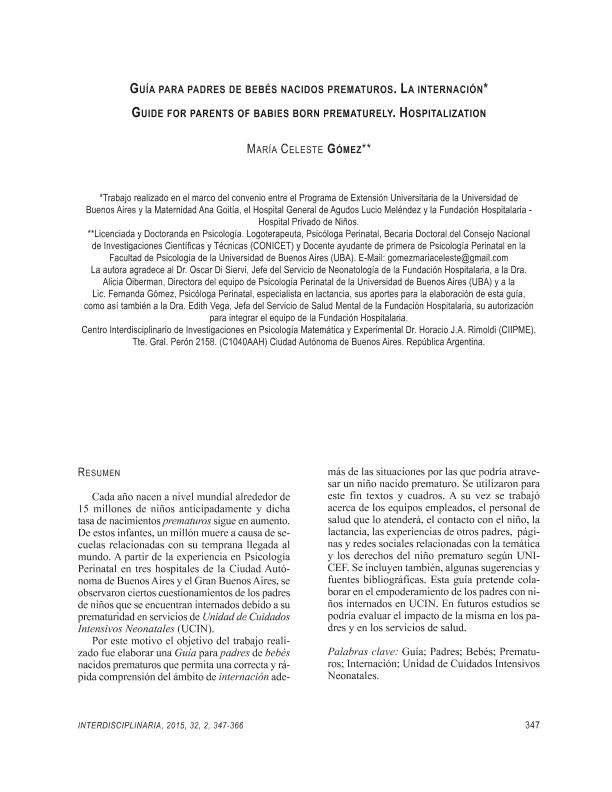Artículo
Cada año nacen a nivel mundial alrededor de15 millones de niños anticipadamente y dichatasa de nacimientos prematuros sigue en aumento.De estos infantes, un millón muere a causa de secuelasrelacionadas con su temprana llegada almundo. A partir de la experiencia en PsicologíaPerinatal en tres hospitales de la Ciudad Autónomade Buenos Aires y el Gran Buenos Aires, seobservaron ciertos cuestionamientos de los padresde niños que se encuentran internados debido a suprematuridad en servicios de Unidad de CuidadosIntensivos Neonatales (UCIN).Por este motivo el objetivo del trabajo realizadofue elaborar una Guía para padres de bebésnacidos prematuros que permita una correcta y rápidacomprensión del ámbito de internación ademásde las situaciones por las que podría atravesarun niño nacido prematuro. Se utilizaron pa raeste fin textos y cuadros. A su vez se trabajóacerca de los equipos empleados, el personal desalud que lo atenderá, el contacto con el niño, lalactancia, las experiencias de otros padres, páginasy redes sociales relacionadas con la temáticay los derechos del niño prematuro según UNICEF.Se incluyen también, algunas sugerencias yfuentes bibliográficas. Esta guía pretende colaboraren el empoderamiento de los padres con niñosinternados en UCIN. En futuros estudios sepodría evaluar el impacto de la misma en los padresy en los servicios de salud.Palabras clave: Guía; Padres; Bebés; Prematuros;Internación; Unidad de Cuidados IntensivosNeonatales. Each year are born prematurely 15 million babies worldwide and premature birth rates continue to rise. One million children die from complications from his prematurity and many survivors face a life with sequels. Prematurity is the leading cause of neonatal death and the second cause of deaths in children under five. In a report by March of Dimes is a need to address urgent measures to deal with the millions of children born premature each year and ensure that all professionals can have an important role to make these measures. So working in the written information provided to relatives of patients admitted in NICU can be one of many possible ways to work on this goal. It is understood by premature baby, every infant born before 37 weeks gestational age. There are classifications of child - ren born prematurely, Unicef puts based on gestational age: Between 36 and 31 weeks referred to Moderate Prematurity, between 30 and 28 weeks, Prematurity Extreme and when the birth occurs before 28 weeks, It is considered very extreme. Through experience in Perinatal Psy - chology in different institutions with hos pi tal ization in Neo natal Intensive Care Unit (NICU) of the Ciudad Autón oma de Buenos Aires and Gran Bue nos Aires, we have noted certain issues and char acteristics particular to the parents of children hospitalized in NICU due to their premature birth. The aim of this work was to create a guide for parents experiencing the hospital ization of their children in NICU that permits rapid and com - prehensive consultation for those un familiar with psychological-medical termino logy. Compre hen - sion is enriched by the addition of images and tables allowing cross-reference. This guide is intended to assist in empowering parents with children in NICU. This paper tries to give an idea that allows to remove the stigma of prematurity and take the child as a person who exceeds its prematurity. The issues dealt with in the guide are gener al ly expressed through questions and corres - p onding answers: What does it mean that my baby has been born prematurely? What situations can my child experience during his/her hospitalization for premature birth and how is he/she assisted? What role do I play as mother or father in the neonatal unit? What care can I give as mother or father to my baby during his / her hospital - ization? What signs does my baby present when they feel un comfortable or in pain? How can I comfort my baby? What is the experience of breastfeeding for a baby born prematurely? Can other family mem bers visit my baby while he / she is hospitalized in the NICU? Is there a parents’ group? What exami nations will my child need after being discharged? Other informative items are added to help parents realize they are not the only ones, such as UNICEF’s Rights of the Premature Child, experiences and feelings of mothers and fathers of babies born pre maturely, the sense of personal exp eri ence, recommendations, sites of interest on the internet (web and social networks) and biblio graphical references. We stress the use of the phrase child / ba by born prematurely and not just premature, to highlight that this child is a person who goes beyond the circumstance of having been born prematurely. This helps the parents to think of the situation as related to an experience in the life of their child and in their lives, rather than a constant in time, thus aiming to avoid future stigmatization, anxiety and over - protection. In future studies could evaluate the impact of this guide on parents and health services.
Guía para padres de bebés nacidos prematuros: La internación
Título:
Guide for parents of babies born prematurely: Hospitalization
Fecha de publicación:
12/2015
Editorial:
Centro Interamericano de Investigaciones Psicológicas y Ciencias Afines
Revista:
Interdisciplinaria
ISSN:
1668-7027
Idioma:
Español
Tipo de recurso:
Artículo publicado
Clasificación temática:
Resumen
Archivos asociados
Licencia
Identificadores
Colecciones
Articulos(CIIPME)
Articulos de CENTRO INTER. DE INV. EN PSICOLOGIA MATEMATICA Y EXP. "DR. HORACIO J.A RIMOLDI"
Articulos de CENTRO INTER. DE INV. EN PSICOLOGIA MATEMATICA Y EXP. "DR. HORACIO J.A RIMOLDI"
Citación
Gómez, María Celeste; Guía para padres de bebés nacidos prematuros: La internación; Centro Interamericano de Investigaciones Psicológicas y Ciencias Afines; Interdisciplinaria; 32; 2; 12-2015; 347-366
Compartir




